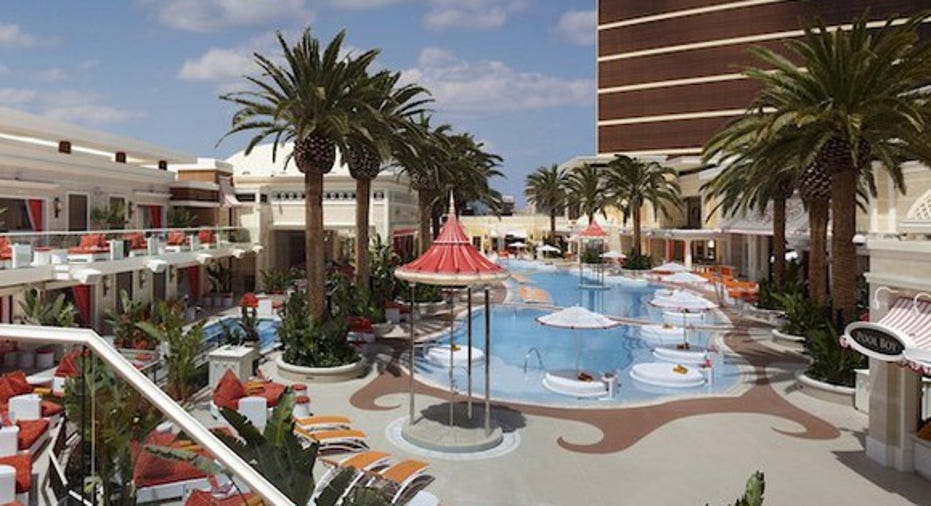This Isn't Your Parents' Las Vegas Strip

Early Paradis Park renderings from Wynn Resorts. Image source: Wynn Resorts.
When Steve Wynn unveiled a potential $1.5 billion Wynn Resorts expansion called Paradise Park, the idea wasn't driven by a big casino expansion with shiny new slot machines and table games. It was driven by the reality that resorts in Las Vegas today make more money off the casino floor than they do on it.
Even when the bill for an expansion like Paradise Park runs in the billions of dollars, the money to be made is in experiences, clubs, restaurants, shops, and hotel rooms. This isn't the Las Vegas your parents knew a few decades ago.
Club money is unbelievable
At the heart of the new Las Vegas are night-and-day clubs. The 2015 Nightclub & Bar Top 100 List had seven Las Vegas clubs among the top 10 highest-grossing clubs in the country. Wynn Resorts' XS Nightclub took the top spot with an estimated $103 million-$105 million in revenue. Hakkasan, in MGM Resorts' MGM Grand, made an estimated $100 million-$103 million. TAO Las Vegas, in Las Vegas Sands' The Venetian, was fourth on the list at $50 million-$55 million.
Pool parties are a huge moneymaker in Las Vegas. Image source: Wynn Resorts.
The numbers are eye-popping, even in Las Vegas, especially when you consider that each of those resorts has multiple bars, restaurants, and clubs on top of their biggest moneymakers. Wynn Las Vegas, for example, made $118 million on the casino floor in the first quarter and $271 million off it. Las Vegas Sands' properties on the Strip made $104 million in the casino and $281 million off it. MGM Resorts made 51% of its first-quarter revenue in the casino, but that's skewed by Macau's gaming-centric resorts being folded into operations. In Las Vegas, it's a safe bet that well over half of the company's revenue comes off the gaming floor.
Cheap food, meant to draw gamblers to slot machines, and perks for high rollers used to be the norm in Las Vegas, but today it's partygoers who are willing to spend thousands of dollars on bottle service and luxurious suites that resorts are catering to.
The new Las Vegas is here
The big construction on the Las Vegas Strip in the past year shows just how far companies are willing to go off the casino floor. Behind New York-New York, theAnschutz Entertainment Group (AEG) and MGM Resorts built T-Mobile Arena, a stadium with seating for up to 20,000 that cost $375 million to build. It's not anywhere close to the casino floor by Las Vegas standards and is meant to be a moneymaker all on its own.
Paradise Park at Wynn Las Vegas is expected to be the same concept. Steve Wynn said on his first-quarter conference call that he would charge $20 to $30 just for entry into the park, whether it's through a resort fee or flat-out charge. He even estimated that the revenue from that charge alone could be around $150 million -- and that's before drinks, food, shopping, and any entertainment revenue.
The strategy is working
The proof that the non-gaming strategy is working can be found in resort earnings. Between 2010 and 2015, MGM's wholly owned resorts saw EBITDA (a proxy for cash flow) increase 33% to $1.7 billion. Wynn Las Vegas saw EBITDA jump 95% to $477 million. Las Vegas Sands' Las Vegas properties were up 18% to $306 million. And that growth is despite the addition of The Cosmopolitan Las Vegas and CityCenter Las Vegas.
Gambling will still play a key role in Las Vegas resorts making money, but gone are the days of smoky casinos with complimentary hotel rooms as the draw to the city. Food, drinks, entertainment, and luxury hotel rooms are the future of Las Vegas, for better or worse.
The article This Isn't Your Parents' Las Vegas Strip originally appeared on Fool.com.
Travis Hoium owns shares of Wynn Resorts, Limited. The Motley Fool owns shares of Wynn Resorts, Limited. Try any of our Foolish newsletter services free for 30 days. We Fools may not all hold the same opinions, but we all believe that considering a diverse range of insights makes us better investors. The Motley Fool has a disclosure policy.
Copyright 1995 - 2016 The Motley Fool, LLC. All rights reserved. The Motley Fool has a disclosure policy.



















